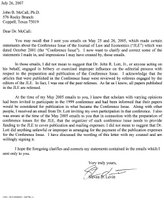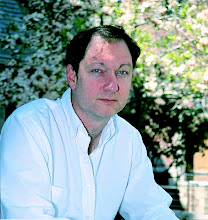A copy of the judge's decision can be downloaded here. A Copy of
Levitt's Correction Letter can be obtained here.1) The Judge has found that one of the two counts of defamation involving Levitt can proceed.
p. 15: ". . . Levitt's email sounds as if he was "in possession of objectively verifiable facts." In his email Levitt states: 'It was not a peer refereed edition of the Journal. For $15,000 [Lott] was able to buy an issue and put in only work that supported him. My best friend was the editor and was outraged the press let Lott do this.' First, it would be unreasonable to interpret Levitt's unqualified statement that the journal edition was not 'peer refereed' as Levitt merely giving his opinion on the 'peers' chosen to review,or referee, the Special issue. Indeed, the editor of the Journal might be able to verify the truth or falsity of whether the Special Issue was reviewd by peers. Furthermore, while Levitt argues that one person's "'peer' in the academic realm may be another person's 'hack'," this distinction is not reasonable when discussing the review process at a top university's academic journal. Second, a reasonable reader would not interpret Levitt's assertion that "For $15,000 [Lott] was able to buy an issue and put in only work that supported him" as simply a statement of Levitt's opinion. Levitt's email appears to state objectively verifiable facts: that Lott paid $15,000 to control the content of the Special Issue. . . . Levitt's motion to dismiss Count II of Lott's Complaint is denied."
2) p. 7: "The applicable standard, however, is not that of the 'world of academic research and scholarship' that Lott describes. Rather, the critical question is how a 'reasonable reader' would interpret the phrase. The reasonable reader in this case is the general population . . . . In everyday language replicating results does not necessarily mean analyzing identical data in identical ways . . . ."
Response: I think that the market for the book was also aimed at academics. The book is apparently marketed to a large number of economics classes and is read by academics.
Levitt's correction letter
Many comments have been posted on this letter based upon the news story written on it in the Chronicle of Higher Education, but few have seen
Levitt's actual correction letter. Among those commenting on the original news stories please see
Ted Frank,
Ben Zycher,
John Palmer,
Craig Newmark,
Robert Wallach,
Clayton Cramer,
Larry White,
Steve Sailer,
Xlrq,
Jonathan Adler,
Michael Munger,
Steve Sailer again,
Glenn Reynolds,
Say Uncle,
Jode Shoo,
Singular Values, and
The Corner. Unfortunately, at this point, I am not allowed to really comment on this. One part of Levitt's letter that has not gotten any attention is the one that I think was his most important, his statement that:
"I also was aware at the time of the May 2005 emails to you that in connection with the preparation of conference issues for the JLE that the organizer of each conference issue needs to provide funding to the JLE to cover publication and mailing expenses. I did not mean to suggest that Dr. Lott did anything unlawful or improper in arranging for the payment of the publication expenses for the Conference Issue."The Chronicle of Higher Education has had a couple of articles on all this:
See
this from the Chronicle.
See also this:
According to the motion, new facts have come to Mr. Lott’s attention since last year that significantly alter the character of his complaint. For one thing, he says, new information has come out about what he calls Mr. Levitt’s malice toward him. The motion alleges that Mr. Levitt has publicly referred to Mr. Lott as “the anti-Christ” and that Mr. Levitt “offered publicly to pay colleagues if they would humiliate” Mr. Lott. (Mr. Levitt did not immediately reply to a request for comment today.) One point that wasn't directly mentioned by anyone is that Levitt's response when asked to backup is claim that others hadn't replicated my research was that the research papers were not refereed. Not only is Levitt acknowledging that the papers backed up and replicated my research, but he is admitting that the papers that did so were refereed.
The date on this letter does not match when I received it.
Update: See also
this follow up filingLabels: SteveLevitt







